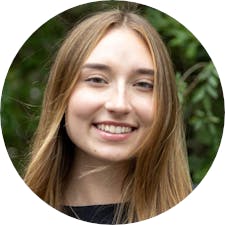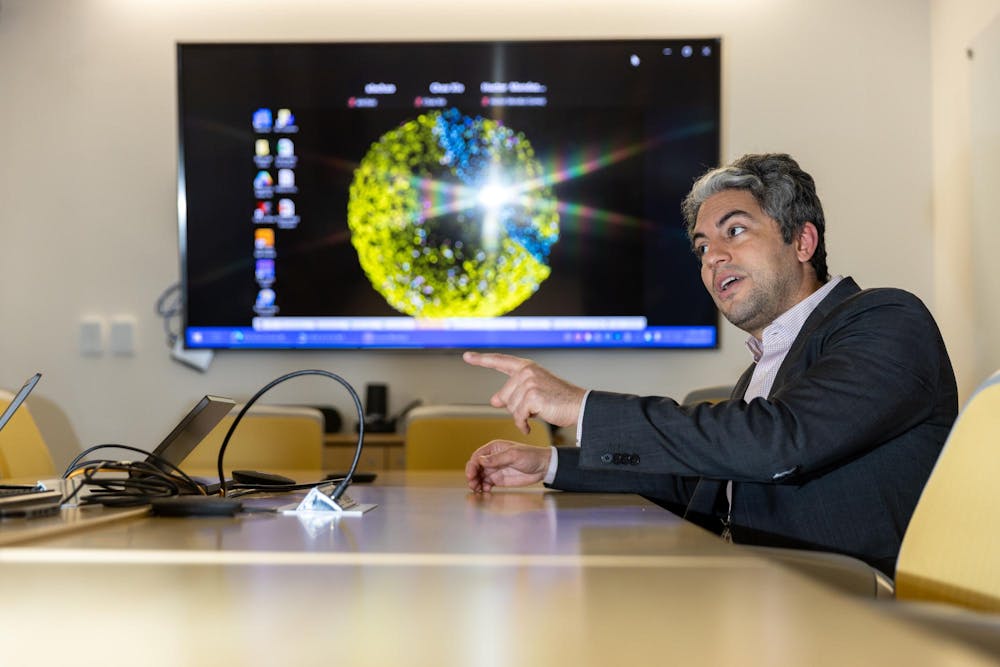This article has been corrected to reflect the correct spelling of Dr. Elias Sayour's name.
A universal vaccine developed by UF scientists has shown breakthrough results for cancer treatment.
Even after someone is diagnosed with cancer, their body’s immune system might not know to kick into action if the tumor is “silent,” scientists say. This vaccine will spur the defense response to begin fighting the disease.
Scientists previously developed a personalized cancer vaccine, which is designed for a specific type of cancer. But this more recent universal vaccine is meant to keep the cancer at bay while patients wait for the personalized vaccine to be made. The personalized vaccine successfully passed human clinical trials, while the universal vaccine is approaching this stage next.
Six years in the making
Scientists tested the mRNA vaccine on mice over the course of about six years in labs across UF’s McKnight Brain Institute. The vaccine caused tumors in the mice to shrink, and, in certain cases, completely wipe them out.
Pairing the vaccine with common anticancer drugs, called immune checkpoint inhibitors, produced these optimistic results.
Scientists published the findings of the study in the science journal Nature Biomedical Engineering. Dr. Sadeem Qdaisat, co-writer of the paper, stressed the difference in this trial compared to other universal cancer vaccine efforts.
Most other universal cancer vaccines try to target the right tumor from the start, whereas this one spurs the immune system into identifying anything cancerous on its own.
Some cancers stay invisible, because the body’s first alarm never rings, Qdaisat wrote in an email. To work around that hurdle, this vaccine gave a brief alarm to the immune system using early type-I interferons, which are the first line of defense against infections. This allowed the immune system to remember the tumor, making immunotherapy more effective.
Qdaisat is a clinical fellow in pathology at Mass General Brigham but graduated from UF in 2024 with his doctorate in genetics and genomics. He said his training in leading cancer centers around the world showed him how limited options are when a tumor stays "invisible" to the immune system.
“The possibility of turning those silent tumors visible is the kind of question that gets you out of bed at 4 a.m. to start a 36-hour experiment,” he wrote. “If we can reliably wake the first immune alarm, we can give more patients a real chance.”
Universal vs. personalized
Dr. Elias Sayour, the principal investigator of the UF RNA Engineering Laboratory, mentored Qdaisat during his time at UF. As the leader of the close to 60-person team of scientists developing the vaccine, Sayour said there is reason for hope, but it takes a long time to prove whether the process works.
“It’s hard when you know that there are active children I’m seeing with cancer right now that this is not available for,” he said.
In May 2024, Sayour’s lab published a breakthrough in the personalized vaccine. Scientists tested the vaccine against four patients with glioblastoma, a type of brain cancer, and the vaccine reprogrammed their immune systems to attack the cancer.
Using these findings, the lab created the generalized, or universal, vaccine.
Personalized vaccines are more effective than the generalized vaccine, but they take time, Sayour added. It takes around six to eight weeks to create a personalized vaccine. During this time, the tumor is growing and, in some patients, progresses too much where the vaccine can’t help them.
As a pediatric oncologist at UF Health, Sayour said he has seen the horrible side effects of other cancer treatments in children, like chemotherapy.
“That was very difficult for me,” he said. “What I wanted to do then was develop cancer vaccines that could target a patient’s tumor without the adverse events I was accustomed to seeing with traditional chemotherapy.”
Universal vaccine could change — and save — lives
Sayour said he sees this project as a new standard in cancer treatment to replace the largely chemotherapy-based one. As of now, he and his team are moving forward with human trials to determine whether the universal vaccine can be used as a tool to wake the immune response.
“If that works, that would be truly remarkable, because that will unleash a new paradigm for treating cancer,” he said.
A universal cancer vaccine would benefit people like Steve Acree.
Acree is a 70-year-old Brooker, Florida, resident who was diagnosed with prostate cancer in 2023. He said he knows a lot of people who battled cancer, including his younger brother, Kevin, who died of colon cancer at 44 years old in 2002.
“A vaccine would be incredible,” he said. “It would be amazing.”
Acree underwent surgery to remove his prostate at UF Health in 2023. Though he didn’t receive any radiation or chemotherapy treatment, he said he’s been left with bladder issues that completely affect his life.
“Anything they could do that would stop this would be amazing,” he said. “It would give a lot of people hope.”
Contact Sofia Bravo at sbravo@alligator.org. Follow her on X @sofiab026.

Sofia Bravo is The Alligator's Spring 2026 opinions editor and a junior journalism and political science student. She previously served as the enterprise health reporter, a copy editor and a translator. In her free time, she enjoys reading and bothering her friends with her digital camera.






